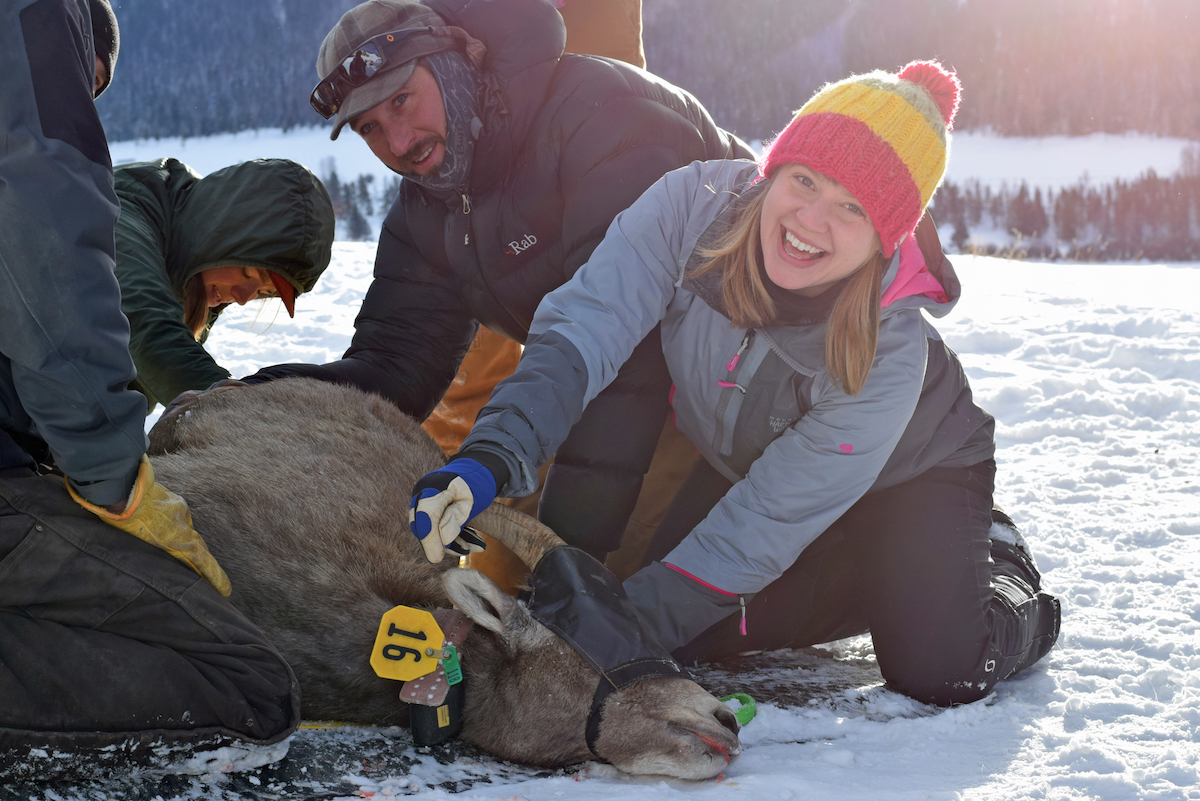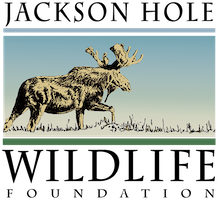One of the perks of working for the Jackson Hole Wildlife Foundation is that occasionally you get invited by local scientists to do really, really cool stuff! Case in point, this past weekend staff traveled into the Gros Ventre Range with a crew of researchers to briefly capture, study and release bighorn sheep. Witnessing a small helicopter carrying blindfolded, restrained sheep at one or two at a time is very cool! This might sound alarming to some, that sheep would be transported from location to location via helicopter, but be assured that the animals are caught in the shortest possible time, with the least amount of stress. Furthermore, the purpose for this “trip of a lifetime” is to conduct science that will ensure the long-term survival of this iconic species of the American West.

The helicopter brings in two bighorn sheep for a gentle landing.
The Wyoming Game and Fish Department (WGFD) is continuing its multi-year research project on bighorn sheep in the Jackson Region. On December 10 and 11, 2016, 10 female bighorn sheep (previously fitted with radio collars) were captured for disease testing in an effort to learn more about their survival and migration patterns. Samples were collected to test for respiratory pathogens that can cause pneumonia. In addition, researchers from Dr. Kevin Monteith’s lab at Wyoming Cooperative Fish and Wildlife Research Unit at the University of Wyoming performed an ultrasound on each animal to measure body fat. This is a three-year study evaluating how body condition is related to pneumonia outbreaks.
The Jackson herd, which numbered 500 animals in the 1990s, has experienced two significant die-offs in recent years. In 2001, it was estimated that as many as 50% was lost due to a pneumonia outbreak and another estimated 30% lost again in 2011. Today it is estimated that the Jackson herd has climbed back to around 425 animals currently.

Kate Gersh and Greater Yellowstone Coalition wildlife program coordinator Chris Colligan assist the research team.
By monitoring individual female bighorn sheep (ewes) through time, researchers are assessing nutritional condition, pneumonia infection, and linking those data to reproductive performance, survival, and nutritional condition in subsequent seasons. At a minimum, they hope to begin to shed light on the complex interactions in the population dynamics of bighorn sheep and help identify possible management alternatives to reduce probability of pneumonia die-offs. For this specific research project, approximately 20 ewes have been collared. During the first three years of this project, biologists are expecting to recapture these same individual sheep each spring and fall to perform the same round of tests and evaluations. The team will go out again in March 2017, and attempt to catch more of their collared ewes to ascertain pregnancy and other health conditions.
JHWF staff is grateful to have been included in this project over the weekend and we thank the WGFD and Wyoming Cooperative Fish and Wildlife Research Unit for allowing us to see first-hand the efforts involved in conducting field research on bighorn sheep. We also thank all those involved for continuing to support wild sheep conservation efforts — you are doing excellent work!
View an image gallery of the work here.
References:
Bighorn Sheep Surveillance. (2016, March). Wyoming Game and Fish Department: Jackson Region Monthly Newsletter, 1. Retrieved December 13, 2016, from https://wgfd.wyo.gov/WGFD/media/content/PDF/Regional Offices/Jackson/2016_Mar_Jackson.pdf
Interview with Aly Courtemanch, Wildlife Biologist with Wyoming Game and Fish Department [Telephone interview]. (2016, December 13).
Koshmrl, M. (2015, March 25). Bighorns get their checkup. Jackson Hole News & Guide.
Nutritional dynamics and interactions with disease in bighorn sheep. (n.d.). Retrieved December 13, 2016, from http://wyocoopunit.org/projects/nutritional-dynamics-and-interactions-with-disease-in-bighorn-sheep.
